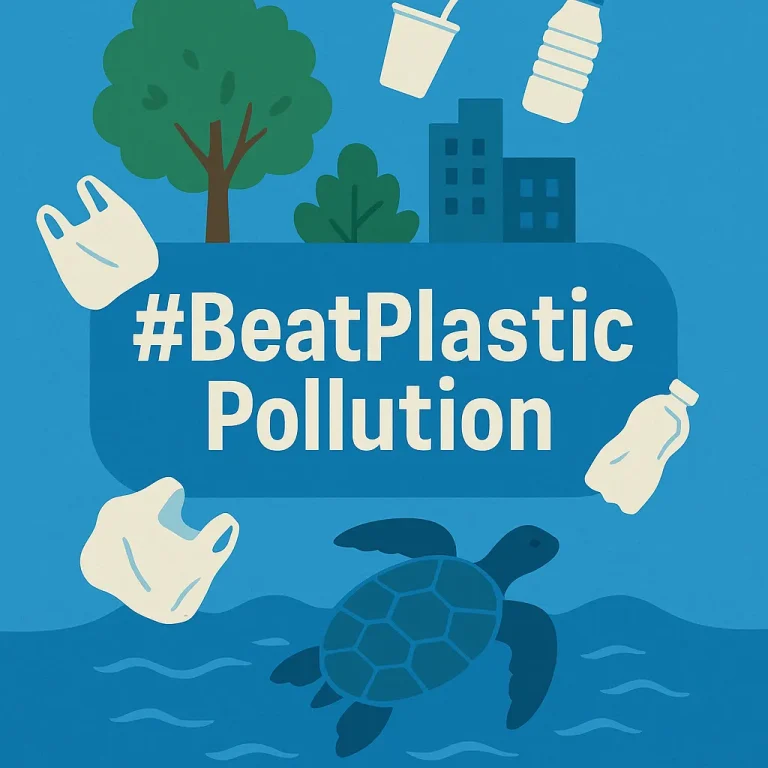Millions around the world joined governments, civil society, businesses, and communities on Wednesday to mark World Environment Day (WED) 2025, with a unified call to end plastic pollution. Themed #BeatPlasticPollution, this year’s global observance highlighted the growing urgency to tackle one of the planet’s most pervasive environmental threats.
Official celebrations were held in Jeju Province, Republic of Korea, where global leaders and environmental advocates gathered to rally support for sustainable solutions to plastic waste. The event comes just two months ahead of renewed negotiations toward a legally binding Global Plastics Treaty under the UN framework.
“Plastic waste clogs rivers, pollutes the ocean, and endangers wildlife. And as it breaks down into smaller and smaller parts, it infiltrates every corner of Earth—from the top of Mount Everest to human breast milk,” said UN Secretary-General António Guterres in his message for the day. “Yet there is a movement for urgent change. But we must go further, faster.”
Lee Byounghwa, Vice Minister of Environment for South Korea, emphasized the need for behavioural and systemic shifts. “Before plastic pollution ends us, we must beat plastic pollution ourselves,” he said. “Let us set aside the comfort of convenience and start with small actions, together.”
Jeju Province has committed to ending plastic pollution by 2040, implementing a circular economy model that reduces single-use plastics while increasing recycling and reuse.
Inger Andersen, Executive Director of the United Nations Environment Programme (UNEP), echoed the urgency: “Ending plastic pollution is not only possible—it is necessary for our health, our economies, and our planet. But recycling alone won’t cut it. We need to rethink how we design, make, and use plastics.”
Across continents, World Environment Day 2025 sparked bold initiatives and creative campaigns:
- Mexico: President Claudia Sheinbaum launched a National Strategy for Beach and Coast Cleanup (2025–2030), aiming to eliminate 100% of plastic waste from beaches within five years.
- Airports and Public Transport Hubs: Major travel points in Baghdad, Beijing, Brussels, Geneva, and Japan displayed environmental messages, reaching millions of passengers.
- Landmarks and Billboards: New York’s Times Square billboards, Geneva’s Jet d’Eau, and city halls across Belgium lit up in support of the global campaign.
- India: UNEP’s Tide Turners Plastic Challenge Summit showcased youth-led success stories in plastic waste reduction. The initiative has engaged over 980,000 young people in more than 60 countries since its launch.
- Chicago: A striking 245-foot mural, Stand Tall, was unveiled on the Prudential Building as part of the #EcosystemRestorationMurals series by Street Art for Mankind (SAM), in partnership with UNEP and FAO.
UNEP also launched the Global Plastics Hub, a digital platform offering access to data, tools, and collaborative resources to help governments and stakeholders combat marine litter and plastic pollution. The hub is managed by the Global Partnership on Plastic Pollution and Marine Litter (GPML).
More than 2,500 events were held worldwide, with #WorldEnvironmentDay and #BeatPlasticPollution trending globally. World leaders, including Indian Prime Minister Narendra Modi, UAE President Sheikh Mohamed bin Zayed Al Nahyan, and Spanish Prime Minister Pedro Sanchez, voiced support for coordinated action.
UNEP Goodwill Ambassadors Jason Momoa, Dia Mirza, Antoinette Taus, and Alex Rendell also participated in raising awareness and promoting community-led solutions.
World Environment Day 2025 marks a critical milestone ahead of the next round of UN negotiations on the global plastics treaty. The aim: a binding international agreement to eliminate plastic pollution by addressing the entire life cycle of plastics—from production to disposal.
As former UN Secretary-General Ban Ki-moon noted: “World Environment Day should be a turning point for governments, companies, the scientific community, and future generations to act together.”


